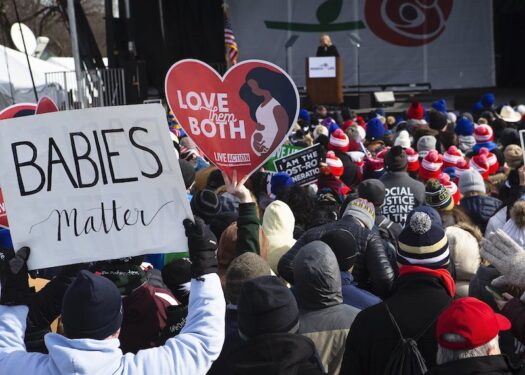
NEW YORK — Ahead of a Senate vote next week, two U.S. Bishops Conference chairpeople have labeled a bill that would codify abortion rights into federal law as “built on a false and despairing narrative” that abortion is the “only, or best, solution to a crisis pregnancy.”
“In treating abortion as the moral equivalent to the removal of an appendix, this proposal is radically out of step with the American public,” Archbishop William Lori of Baltimore and Cardinal Timothy Dolan of New York said in a joint letter to the U.S. Senate. “We strongly urge you to reject this bill and to put the energy and resources of our federal government behind policies that fully recognize and support both mothers and their children.”
Archbishop Lori and Cardinal Dolan chair the Bishops’ Conference’s pro-life and religious liberty committees, respectively.
The Senate will vote on the Women’s Health Protection Act (WHPA) on Mon. Feb. 28. It passed the House in late September in a narrow 218-211 vote largely along party lines. The bill, though, is unlikely to pass the Senate. It needs 60 votes to do so, which is unlikely with strong Republican, and some Democrat opposition in a 50-50 split Senate.
Democratic lawmakers originally drafted the bill in response to the Texas Heartbeat Act that prohibits abortions after the detection of a fetal heartbeat, which can be as early as six weeks into a pregnancy. The Heartbeat Act went into effect in the Lone Star State on Sept. 1.
WHPA would supersede any existing or future state abortion laws. It would codify into law the right to an abortion at any point prior to fetal viability, or when its able to survive outside of the womb, which is considered to be about 24 weeks. It would also codify the right to an abortion after fetal viability when a medical judgement is made that “continuation of the pregnancy would pose a risk to the pregnant patient’s life or health.”
Other provisions in the bill include the ability for a health care provider to provide abortion services via telemedicine, and an ability for anyone seeking an abortion — including minors — to receive one without making “an in-person visit to anyone medically unnecessary or that does not provide the abortion services,” as it labels parental notice and consent laws an obstruction.
Further, it would invalidate ultrasound and waiting period laws. Archbishop Lori and Cardinal Dolan also fear it would invalidate the Hyde Amendment — the longstanding bipartisan provision that prohibits taxpayer funding of abortion.
“Answering the needs of women by promoting taxpayer-funded elective abortion, as this bill would do, is a failure to love and serve women,” Archbishop Lori and Cardinal Dolan wrote. “Offering free or low-cost abortions, instead of the resources needed to care for her child, is not ‘choice’ but coercion,” adding that “it communicates to a mother in need that there is no hope for her or her child.”
U.S. President Joe Biden, a Catholic, signaled his support for the legislation in a joint statement with Vice President Kamala Harris in January. They expressed support for both the WHPA, and the codification of Roe v. Wade, which faces its own challenge in the Supreme Court.
“All people deserve access to reproductive health care regardless of their gender, income, race, zip code, health insurance status, immigration status, disability, or sexual orientation and the continued defense of this constitutional right is essential to our health, safety, and progress as a nation,” Biden and Harris said.
The language of WHPA, sponsored by Congresswoman Judy Chu of California, echoed that sentiment, claiming that the “harms” of abortion restrictions fall mostly on people with low incomes, minorities, immigrants and young people. It also argues abortion restrictions “harm the basic autonomy, dignity, and equality of women, and their ability to participate in the social and economic life of the nation.”
In their statement, Archbishop Lori and Cardinal Dolan said abortion is “the opposite of health care and is an extreme violation of human rights.”
“It has no clear justification in terms of women’s health,” the prelates wrote. “Abortion may even harm women’s health, and their lives, including or especially low-income women.”
They also suggest Congress take a different approach to public policy.
“As a nation built on the recognition that every human being is endowed by its Creator with the unalienable rights to life, liberty, and the pursuit of happiness, we must reject this bill and embrace public policy that fully respects and facilitates these rights and needs of both mother and child,” Archbishop Lori and Cardinal Dolan wrote.
